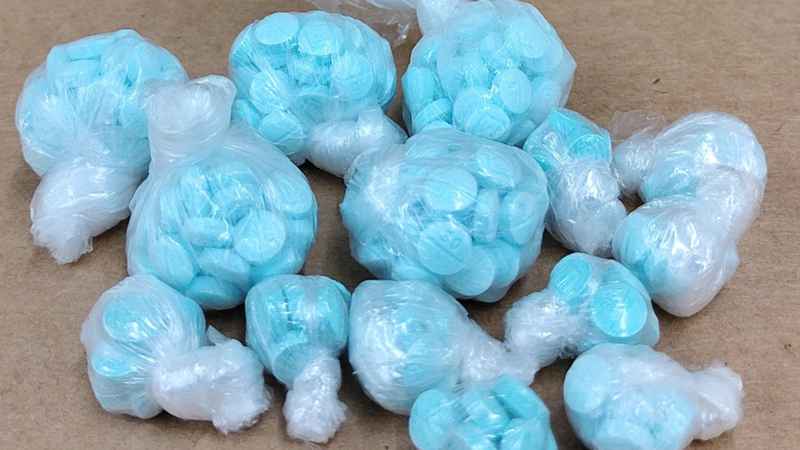Filmmaker profiles young man’s struggle with substance abuse disorder
[anvplayer video=”5071631″ station=”998122″]
At the Woodbury 10 Theatre, an emotional movie premiered — unlike anything ever screened there before.
A movie with a mission.
"Overdoses with fentanyl, with opiates, heroin, it’s a crisis everywhere,” declared filmmaker Joe Carlini. “This is a chance for my family and friends to see the film and also people who are recovering, addicts that are in recovery.”
Carlini, an independent film director now living in Los Angeles is back in his hometown to showcase his new movie, called simply "Josiah."
"Over 100,000 people have died from an overdose in the past year,” he says. “And Josiah’s story is one that we hope can help save lives."

Drugs seized on Nov. 17 during a vehicle stop that field-tested positive for containing fentanyl.[Moorhead Police Department.]
The Centers for Disease Control released that figure on Wednesday. Those numbers aren’t final yet, but it’s a total the nation has never seen before.
Experts say it’s tied to the pandemic and a more dangerous drug supply — and that it’s a problem in Minnesota.
“It’s really devastating because in combination to the pandemic, I think we’ve also got changes to the type of drugs that are available to people on the street,” says Dr. Sara Polley, with the Hazelden Betty Ford Foundation. “There’s been a lot of increased isolation for individuals that struggle with mental health and substance abuse.”
As you may have guessed, "Josiah" is no light popcorn fare.
The movie — shot in Minnesota and several other states — tells the story of Josiah’s six-year struggle with substance use disorder.
“I never thought I needed to educate any of my kids on drugs, I never touched a drug,” recalls Maria Kouts, Josiah’s mother. “My kids came from a good home, Josiah was smart, he made great grades, he was an athlete, just an all-American family, honestly.”
She says Josiah graduated from high school in a small Arizona town in 2011, getting a college scholarship the following year.
Then things changed.
"He had an injury from soccer, he got on a doctor-prescribed opioid and it never stopped from there,” Kouts recalls.
Josiah’s family says he started using street drugs when he was just 19.
"Anyone in the country can relate with someone they know,” Carlini says. “Your next-door neighbor, the kid that has all the potential that gets hooked on drugs and his life falls apart."
The film shows — sometimes graphically — how Josiah started using heroin and fentanyl. His life, see-sawing between substance use and wellness.
“He ODed several times in those six years, he went to several rehabs, he moved abroad to Paris,” Kouts says. “He got married and was clean, did really well and it snuck back on him."
There was no happy ending here.
"He ended up getting a divorce and moving back home, and three months later, he was dead,” Kouts says.
On Jan. 23rd in 2018, Josiah, 25 at the time, overdosed in his room in the family home.
This time, it was fatal.
"I beat in his door and found him laying with a needle in his arm. IV. Heroin,” says Josiah’s father, Jason. “And he was constantly using. I was constantly battling with him back and forth, trying to force him… to get clean. That didn’t work."
Carlini, later reading about Josiah, connected with the family and they agreed to help with the film.
They too came to Woodbury, hoping this project will help others dealing with substance use disorder.
"Of course I’d like to save some more,” Jason Kouts says. “But if we can save one person, the efforts of my son are worth it."
"The opposite of addiction is connection"
The film’s release, at a time of record overdoses, touched many at the premiere — including Randy Anderson, an addiction counselor who’s been in recovery for 16 years after battling cocaine use.
He says pandemic isolation made the opioid crisis even worse.
"I said I hope I never see a day where we see 100,000 deaths in this country and now we’re seeing it,” Anderson said quietly. “We like to say in the recovery world, the opposite of addiction is connection. And when you’re not able to connect with people, really in person, face-to-face, it can be devastating for a lot of people.”
Polley — the medical director for the Youth Continuum at Hazeldon Betty Ford — says isolation and the increase in fentanyl use have been a lethal combination.
“The dealers are supplying these illicit substances to people who are not even aware that may be the case, or how much is in the things they are supplying,” she says. “I’m hoping… with access to vaccines and how that doctors are getting better at being able to treat COVID, that people will feel more comfortable coming out of their homes, going to meetings in the community, accessing services and treatment facilities.”
Carlini says he was inspired to make the film after a high school classmate died from a drug overdose two years ago.
He says he’s getting a lot of inquiries about showing "Josiah" at treatment centers and in the recovery community.
Carlini says because of popular demand, there will be a one-time, encore screening next Tuesday, Nov. 23, at the Woodbury 10, at 7:30 p.m.
“Our main goal is really that prevention matters,” he explains. “And getting students to see this film, to see the endgame of the opioid crisis. If you start doing heroin, if you start doing fentanyl, there’s a good chance you are going to die.”
Maria Kouts — an associate pastor at her church — says she’s now counseling with young people who are battling substance use disorder.
"They say the grief is pain that has nowhere to go,” she says. “After Josiah died, I realized I needed to channel that pain and help others. We say if it’s one life, it’s worth it."